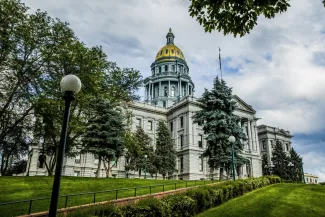
Colorado can now issue licenses to psychedelic mushroom therapy facilitators
Coloradans will soon be able to take psychedelic mushrooms in a regulated environment as the state’s natural medicine program finishes taking shape this year.
The voter-approved program will allow licensed facilitators to conduct therapeutic sessions using psilocybin, the active ingredient found in “magic mushrooms,” starting in 2025. Colorado voters approved Proposition 122in 2022, making Colorado the second state, after Oregon, to decriminalize the use of psychedelic mushrooms.
Patients won’t simply be able to walk into a healing center and leave with psychedelic mushrooms or other psilocybin products for consumption at a later time, as is the case with cannabis dispensaries. Someone interested in participating will need to go through a screening process to determine any risks of taking natural medicine. If they are deemed an appropriate candidate for psychedelic therapy, they will take natural medicine in a secure, regulated environment with a licensed facilitator to supervise and walk them through the entire experience.
As the new year begins, Colorado regulators say they’ve received a handful of applications for the licenses that will be required to cultivate mushrooms, manufacture natural medicines and operate healing centers.

© Evgeniy Grishchenko - iStock-2155580431
Tasia Poinsatte, Colorado director for the Healing Advocacy Fund, said a lag is expected between license applications opening this month and healing centers actually serving clients. Healing centers could open as early as April, but early summer is more likely, she said.
The Healing Advocacy Fund is a nonprofit organization that advocates safe and equitable access to psychedelic therapies. It started in Oregon after voters there approved a state-regulated psilocybin program in 2020.
Personal use provisions of the law, which have been in place since December 2022, allow adults 21 or older to share natural medicines including psilocybin, psilocyn, ibogaine, mescaline and dimethyltryptamine with others 21 and older for “counseling, spiritual guidance, community-based use, supported use, or related services.”
Advocates say psilocybin will serve as another tool in the mental health care toolkit that can help Coloradans who are struggling, particularly veterans. Research has suggested psilocybin could be used to treat post-traumatic stress disorder, obsessive-compulsive disorder, substance use disorder and major depression. The U.S. Food and Drug Administration has designated psilocybin as a “breakthrough therapy” option for treatment-resistant depression and major depressive disorder.
“That breakthrough therapy designation means that FDA believes psilocybin may demonstrate substantial improvement above and beyond what’s currently available for treatment,” Taylor West, executive director of the Healing Advocacy Fund, said during a December press conference. “In Colorado, we know that we’re dealing with a mental health crisis much like we are in the rest of the country, and that’s part of the reason that psychedelic therapy has been supported by voters and by many in the mental health care field.”

There are four steps to the psilocybin therapeutic model in Colorado: assessment, preparation, administration and integration. First, an interested participant will go through a screening process to determine if they are a good fit for psychedelic therapy and the type of facilitator they would work best with. The participant then meets with their facilitator to learn about the administration process, set goals for their session and develop a safety plan.
Then, the facilitator will administer psilocybin at a licensed service center, overseeing the session and supporting the participant throughout. An administration session can last five hours or longer. The participant will meet with their facilitator again after their session to “integrate insights and learnings from the psilocybin experience into daily life” and make plans for future support needed.
Participants will primarily take psilocybin at a healing center, but the law will also permit clinical facilitators to offer psilocybin services at their existing practice, a retreat model where participants may stay overnight and reflect on their experiences for several days, and at-home administration with additional safety measures in place.
Local governments in Colorado are able to determine when and where healing centers may operate, but they cannot outright ban them. Arapahoe County Commissioner Jessica Campbell said at the Healing Advocacy Fund press conference that local governments should protect access in their communities so that anyone in Colorado can take advantage of the new therapeutic option.
“Colorado’s psychedelic therapy program is also estimated to be less than 1 percent of the size of Colorado’s cannabis market, but could make 100 times the difference in patients’ lives,” Campbell said. “Most importantly, I would urge local decision makers to think about the veterans, patients, survivors, and others suffering in our communities right now who could benefit from this therapy.”
State regulations and licensing
West said the state-regulated model works as “a complementary pathway” to ongoing federal evaluations of psychedelic therapy, offering another tool for mental health care without making prospective patients wait through the FDA’s review process.
“State regulated programs also allow people to use this medicine and these treatments for more than just a narrow, specific diagnosis of a condition,” West said. “So people can use them not only for when they’re having a mental health crisis, but actually use them to build up resilience and wellness before they experience a mental health crisis, and that’s something that doesn’t happen within a prescription-based program.”

© fotoguy22 - iStock - 1468912821
Responsibility for regulating the natural medicine program is split between two Colorado agencies. The Colorado Department of Revenue regulates natural medicine businesses including healing centers, cultivation sites, manufacturers and testing facilities, and it will license their owners and employees. The Colorado Department of Regulatory Agencies regulates training and licensing for facilitators who will directly engage with people consuming natural medicine.
DORA has received “a handful” of applications for facilitator licenses, DORA spokesperson Katie O’Donnell said Thursday. Department of Revenue spokesperson Elizabeth Kosar said the department has received three applications for business licenses to operate healing centers or cultivation sites.
“There may be many factors that would contribute to the timing of a business becoming operational once an application is approved,” Kosar said in a statement. “It would be difficult for us to estimate a timeline. The Division will look to make timely decisions on complete applications to support applicants looking to become operational.”
O’Donnell said “no one can begin practicing until there is regulated medicine available,” which won’t happen until cultivation sites are licensed and operating.
Some licenses need to be renewed every year and others need to be renewed every two years.
State licensing fees vary depending on the type of license a facilitator is applying for. Someone seeking a facilitator in training license will pay the state $420 as they work to complete supervised hours required to get a full facilitator license, which costs $840. A clinical facilitator license, which goes to someone with a medical background who plans to offer natural medicine services, costs $970.
A “distinguished educator” license is available for people who have proven substantial experience with natural medicine in another state or country and teach for a facilitator education program in Colorado. That license costs $1,120.
Poinsatte said the licensing fees, which the state only recently finalized, are a bit lower than initially expected, though they are still higher than fees for other licensed professions in Colorado. The fees are “significantly” lower than Oregon’s, though, which Poinsatte said are $2,000 annually for facilitators.
Colorado has already approved several facilitator training programs, which cost anywhere between $7,000 to $11,000 to complete. Anyone 21 or older who has a high school diploma or equivalent and has met the state’s training requirements can become a psilocybin facilitator.
Colorado Newsline is part of States Newsroom, a nonprofit news network supported by grants and a coalition of donors as a 501c(3) public charity. Colorado Newsline maintains editorial independence. Contact Editor Quentin Young for questions: info@coloradonewsline.com.

















